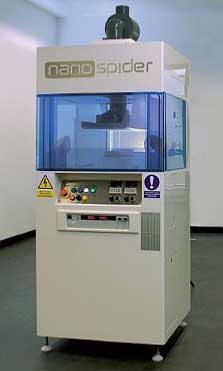
The Elmarco’s Nanospider™ 500 is a machine for producing membranes, mats, and sheets of polymer nanofibers with diameters in the range 80 – 700 nm (depending on the polymer and the spinning conditions used). It uses needle-free electrospinning technology, and is suitable for a wide range of polymers, as well as some inorganic materials. The machine manufactures homogeneous product samples with repeatable parameters in sufficient quantity for final application development, and allows straightforward scale-up on mass-production Elmarco electrospinning machines.
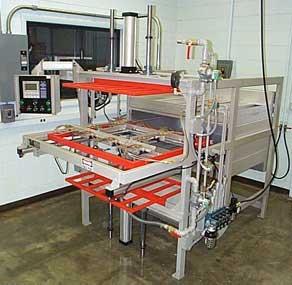
MAAC Model ASP is a 30”x 36” single-station thermoforming machine designed for small part production, R & D and prototyping purposes. Thermoforming is a manufacturing process where a plastic sheet is heated to a pliable forming temperature, formed to a desired shape in a mold, and trimmed to create a usable product.
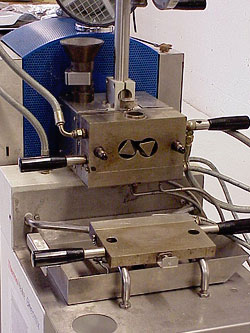
The HAAKE PolyLab OS provides you with process-relevant material data including: melting behavior, influence of additives, temperature stability, shear stability,melt viscosity. Furthermore, this measuring mixer and extruder system supports you in process modelling activities such as: Compounding polymers with additives to reduce flammability, viscosity, etc., scale-up extrusion processes by using different L/D ratios to extrapolate to your master process line, simulating master processes using only as little as 50 g of material to optimize extrusion or mixing in respect to temperature and shear profile or extrusion of strands, profiles or films in combination with rheological or optical measurements. Consequently, you can optimize your process parameters, create test specimens or perform quality control on incoming and outgoing goods with regard to viscosity, dispersion or plasticizing behavior.
Features
- Mobile measuring sensors avoid the necessity of handling of heavy and hot parts
- Integrated heating and cooling circuits reduce the number of plug connections and thus the danger of making incorrect connections
- Several peripheral units such as feeding and post-extrusion units are computer controllable thus meaning better reproducibility and documentation.
Application
- Mobile measuring sensors avoid the necessity of handling of heavy and hot parts
- Integrated heating and cooling circuits reduce the number of plug connections and thus the danger of making incorrect connections
- Several peripheral units such as feeding and post-extrusion units are computer controllable thus meaning better reproducibility and documentation.
Technical Specifications
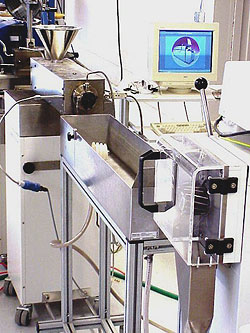
The Extrusion attachment enables the processing characteristics of many materials. The tool is used for screw plastification - i.e. extruding and injection molding - the most common method of processing plastics, rubber, food stuffs and ceramic materials. The measuring extruder contains the necessary measuring, control and monitoring technology for the respective application.
Features
- Mobile measuring sensors
- Integrated heating and cooling circuits
- Peripheral units such as feeding and post-extrusion units
Application
- Extruding and injection of plastics, rubber, food stuffs and ceramic materials
- Measurement of viscosity during processing
- Pilot processes
Technical Specifications
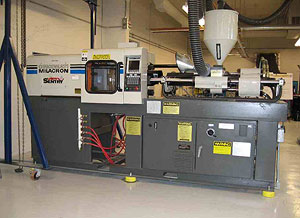
The Cincinnati Milacron model VST55-2.97 horizontal plastic injection molding machine can be used to develop and test new production processes utilizing polymer and composite thermoplastic materials. This machine utilizes industry standard processing for rapid production of small components.
Specifications
- High speed hydraulic ejector
- 33 ton clamping force
- 2.97oz shot size
- Toggle clamp
- Platen Size: 20"H x 19"W
- 9kW mold heater/cooler (AEC model T50-9-4-2)
Applications
- Process development
- Materials/process experiments
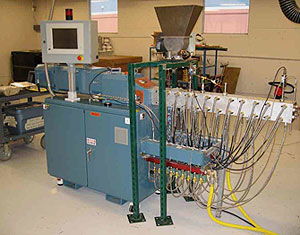
The Coperion Twin Screw extruder is used for process development of polymers and composite materials. Currently the machine is being utilized for experiments involving cellulose fiber processing for future ethanol production sources. This robust machine is capable of running extended production cycles and high torque demand for high viscosity substance mixing and extrusion.
Features
- Polymer mixing and shaped extrusion capabilities
- Multiple section extruder allows thermal gradient, vacuum application, gas injection, etc.
Applications
- Continuous compounding of polymers, technical ceramics and foodstuffs
- Extrusion of tubes, beams, etc.
Technical Specifications
- 6.5 liter extruder capacity
- 82 N-m per screw torque capacity
- 20.6 kW
- 3000 or 1200 RPM screw rotation rate
- Type 21.1 P 82 M
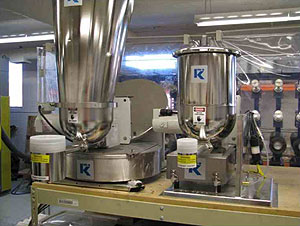
Our K-Tron Compact loss-in-weight feeders are optimized for laboratory applications, pilot projects, and feeding minor ingredients with high accuracy and recipe repeatability. The Microfeeder provides feed rates as low as 0.04 dm³/hr (0.0014 ft³/hr). The Compact Feeder is used for any low feed rate application where high accuracy and recipe repeatability are required.
Features
- Loss-in-weight gravimetric feeders with programmable control independent control of primary (bulk) and secondary (additive) rates
- Twin-screw feeders
Applications
- Controlled ratio feeding for compounding
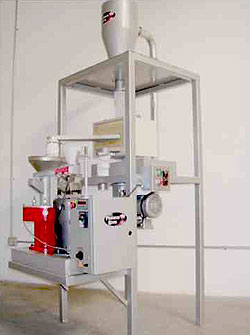
This Powder King® laboratory system provides small sample milling, from one pound to fifty pounds. The PK-18 saves valuable time when milling small samples, and is also quick and requires little clean time. This saves from pulverizing small samples on a large system that requires hours of cleaning. The PK-18 can be cleaned and ready for the next sample in less than ten minutes.
Features
- Gap adjusting from outside mill with single stud, push/pull adjusters
- Poly hopper
- Variable-speed drive on mill motor with dynamic braking
- Vibratory feeder with control
Applications
- Pulverizing small sample sizes for R&D purposes
Technical Specifications
- 8" Disks
- Aluminum mill housing with integrated bearing housing
- Flywheel mounted on tapered shaft to run within 0.001"
- 5 HP motor
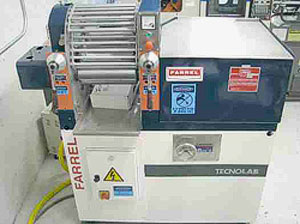
Configured for both rubber and plastic applications, the Farrel Two-Roll Mill is designed for multi-batch routine milling. The controls are designed and engineered to provide the flexibility required in R&D environments.
Features
- More accessible front roll
- 1.3 lb capacity
- 350°F max Temp
Technical Specifications
- Roll Diameter: 6 in (152 mm)
- Roll Width: 13 in (330 mm)
- Sheeting Capacity: 3 lb (1.4 kg)
- Front Roll Speed: 34 to 17 rpm
- Rear Roll Speed: 24 rpm, Fixed
- Friction Ratio Range: 0.71:1 to 1.41:1
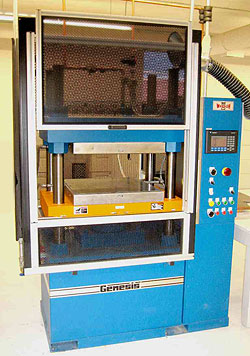
The Wabash Genesis press is a hydraulic press for compression molding of rubber, plastics and composites, and laminating and assembly of preimpregnated thermoset and thermoplastic composites.
Features
- Automated cure cycles
- Programmable controller (12 segment maximum) heated and cooled cure recipes
- Water-cooled platens
Applications
- Pressed sandwich laminate structures
- Compression molded rubber and plastic parts
- Thermoplastic and thermoset composite parts
Technical Specifications
- Adjustable clamp force: 0 to 100 tons
- Platen size: 24" x 24"
- Heated Platens up to 800°F (15°F/min. heat-up rate)
- Automatic transfer from closing to pressing speed
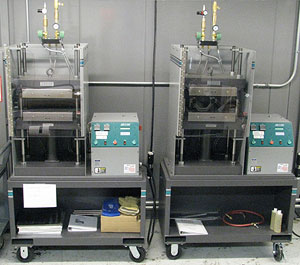
Features
- 30 ton clamping force
- Heated and cooled platens - 15" x 15", 650°F max
- Programmable heating, cooling and force control
Applications
- Compression molding
- Flat sample and sandwich construction
- Film stacking